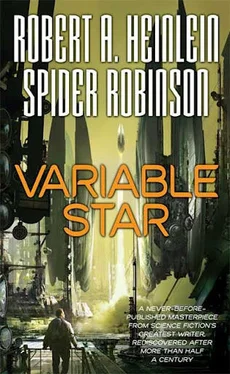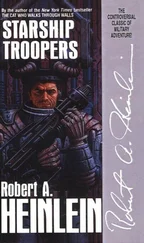There are times when I’m happier to have a vivid imagination than I am other times.
“But there will be no shortage of damp places. Bravo has almost as much salt water cover as Terra—a bit more than half its total surface, compared to Terra’s seventy percent. What you get basically is three major continents, more or less evenly spaced around the globe, each supporting a large dense jungle, with a major river flowing out of each, as in the Terran Amazon or Congo. There are also several large continental islands analogous to Australia, and if you’ll pardon the technical terminology, umpty gazillion smaller islands, ranging in size from humungous to teeny-weeny.”
“Okay, got it. The farther from the seashore, the more fire danger… but there’s a lot of seashore.”
He nodded. “The planet’s axial tilt is only fifteen degrees, as compared to Terra’s twenty-three point four five degrees. So there will be distinct seasons… but less pronounced than on Earth. No freezing winters. No polar ice caps.”
That was good. I hate wearing stanfields—as long underwear is called in Canada, for reasons probably lost to history and certainly unknown to me. A world without snowdrifts was just fine with Joel. And no polar ice meant more of the total surface available to live on; more places to put usable seashore.
“And the day/night cycle—”
That one I could address. “—is nearly identical to Mars. Twenty-four hours, thirty-something minutes. Uh, thirty-seven.”
“Of course, that must be what the Zog has you using on the Upper Deck. Well, the farming is probably going to be even better on Bravo than it is in Zogland.”
“Really?”
He caused images to slideshow on his wall, some still, some moving—and all striking. “As you can see, the place is tectonically quite active. Volcanic mountain ranges. Good thing; it keeps the atmosphere replenished. So volcanic ash fertilizes the land—and the mountains present useful minerals and metals which we reach by blasting a little bit sideways instead of digging way down and hauling it back up. But from a peasant’s point of view, the best part is going to be the weather: probably the most stable climate humans have yet encountered.”
Well, I hadn’t said it in several minutes now. “Why is that, Matty?”
“Consider the geography.” He smiled. “Or bravography, if you will.”
“ I won’t, but you go ahead.”
“Thank you. Look at those three major continents. All more or less equatorial. Roughly evenly spaced. Each of them will have a bravographically anchored transportation zone, where jungle trees pump a regular fountain of water into the atmosphere. Ergo, climate patterns will be anchored, too, with weather infinitely more stable and reliable than anyplace in the Solar System.”
I understood what he meant when I saw the planet in 3-D projection. Terra is continually plagued by nerve-racking El Niño events because the committee that designed it (it had to be a committee) inexplicably omitted to place a large jungle in the middle of the Pacific Ocean, to anchor that evaporation zone. Bravo lacked this defect. “And that stable weather forecast will be… gray skies, lots of clouds? Rain in the morning giving way to rain in the afternoon, followed by a high probability of rain all night?”
“In general, yes, around the equator. With more temperate zones to north and south. But the three big continents themselves will be fairly temperate, and covered with boreal forest.”
“A lot of our oldest myths will still work.”
He nodded happily. “And some others will become for us historical curiosities, requiring footnotes. On Terra, there tend to be large deserts to the north and south of all the jungle areas, including the Sahara, Kalahari, Gobi, Patagonian, and Sonoran deserts. But Bravo does not seem to have real deserts, probably thanks to its more favorable climate distribution.”
“Okay by me,” I said. “I never met a desert I liked much.”
“Oh, I have!” he said emphatically. “I’ll miss them. Splendid places to do astronomy. But by surrendering them, I’ll get to see something unique in their place. I’ve seen a desert. I’ve lived in a few. But so far, as far as I know, nobody has yet seen a Hungry Ghost with his own personal eyeballs, much less spent time in one.” He sounded gleeful at the prospect.
“A Hungry Ghost?”
“A firestorm the size of a state or province.”
The name sort of explained itself to an extent. One-third gee, and a teeming stable biosphere—the land would be lush with life. The trees must grow to fantastic heights, and sprawl across the sky in the competition for sunlight. But the air they spread through was nearly a third oxygen, fifty percent more than a sensible planet needed… which they themselves were replenishing! Let things get dried out in the stable weather, let the ground cover vegetation and tree droppings crisp up nicely into tinder and kindling, let one of the inevitable sparks occur in a very bad place…
“Tesla’s eyebrows, Matty! It must be all the circles of Hell.”
“Worse, I think.” The bastard was still gleeful. “I’m not saying those were fun, but they all stayed put . Once you reported to your Circle and took your assigned spot in the lake of burning pitch, you pretty much knew your address and postal code for the next quadrillion eternities. But Bravo has more sunlight and higher temperatures than Earth, so—”
“—so it’s going to have serious winds.”
“Sometimes. And sometimes hurricanes. Primarily in tropical ocean regions. But also in high elevation land plateaus… where forests tend to dry out.”
“Oh, that’s not good!” Now I fully understood the aptness of the name he’d picked. I had all too vivid a mental picture of a firestorm, the size of Central British Columbia, say… that lurched and lunged randomly across the landscape at hurricane speeds, gulping biomass like a drunken sailor on a spree, spewing flames to altitudes previously reached in human experience only by mushroom clouds and weather balloons. Hungry Ghost indeed! Like the Hungry Ghosts I had encountered in my quick surface reading of Tibetan Buddhist mythology: spirits consumed with lust for things that never satisfied, hunger that could not be eased, thirst that nothing could quench. Damned souls condemned to yearn forever, and destroy all they touched, knowing it was pointless. I wondered if a Hungry Ghost typically had an eye, like a hurricane, and how long you’d have to live if you ever found yourself in one. Would it be even theoretically possible to move quickly and correctly enough to stay in such an eye, until the Ghost’s terrible Hunger burned itself out?
“But that’s only going to worry certifiably insane explorer types like me, who go looking for danger,” he said with a chuckle. “Farmers who pick their homestead site intelligently, on the other hand, are probably going to be very happy people in Saudade.”
Incongruous image of pigs on the Ag Deck. “Sow what?”
“That will be the name chosen for the first town we’ll settle. You heard it here first.”
“How can you be so sure, this far in advance?”
“Because that’s what I strongly feel it should be, and nobody aboard with a contrary opinion is a bigger bully than me.”
“It would be impolite to argue with my host. Say the name again, and tell me what it means.”
“ Saudade . ‘Sow,’ like a female hog. ‘Da,’ like the Russian for ‘probably not.’ ‘Day,’ light come an’ me wan’ go home.”
“You can’t possibly know that song.”
“Neither can you, son. And if you do, you ought to know the word ‘ saudade .’ It’s a Portuguese word, and the heart of the Portuguese music called fado . You could say it is as important a word to fado as ‘soul’ is to blues, or ‘cool’ is to jazz. And as difficult to define.”
Читать дальше










